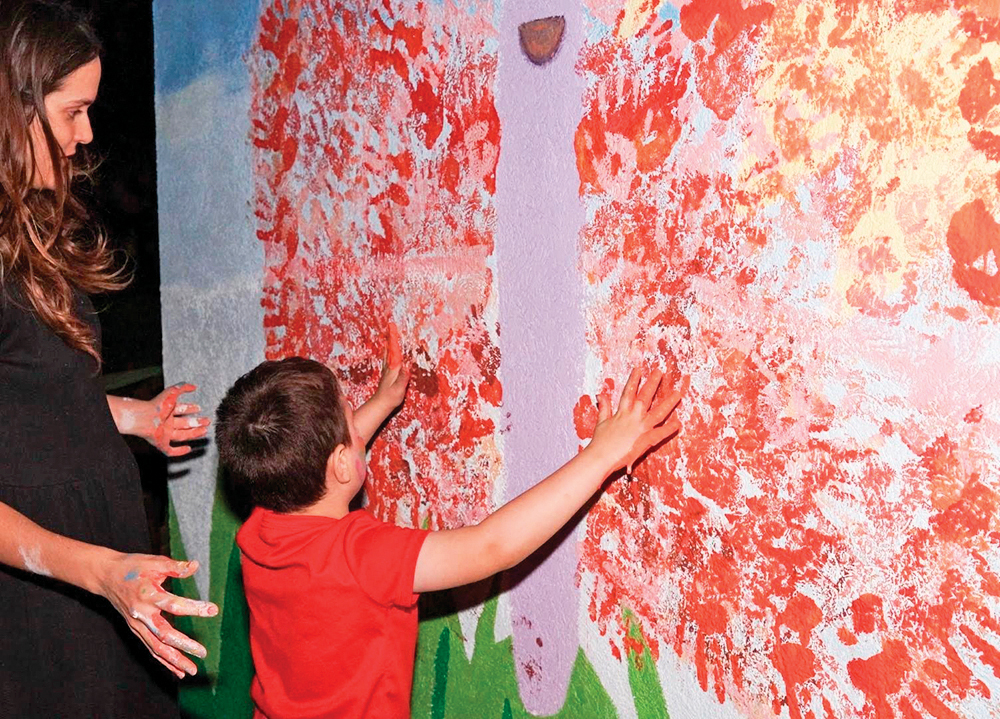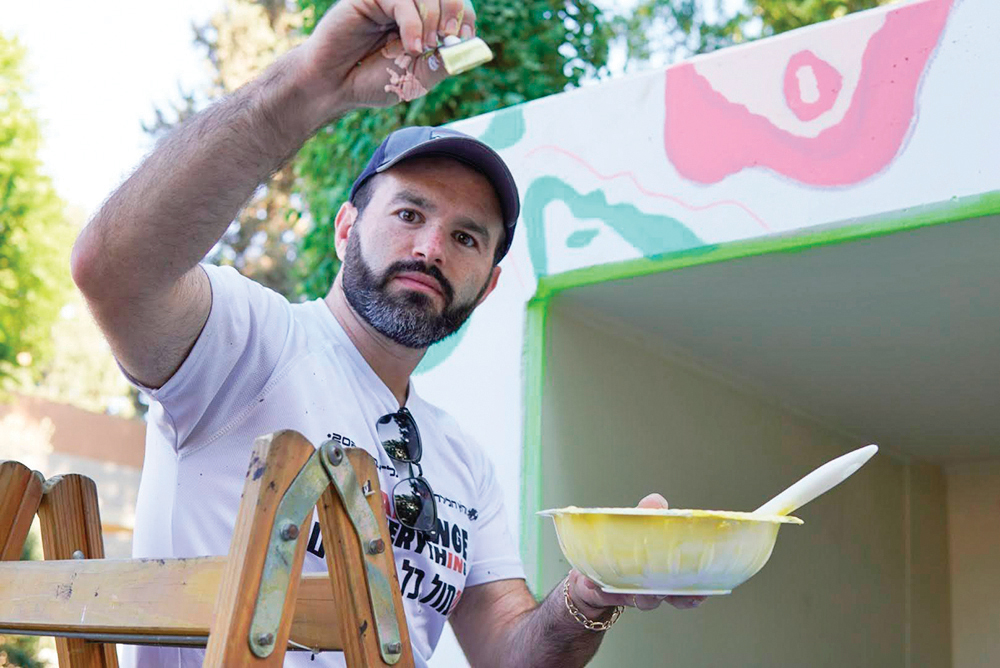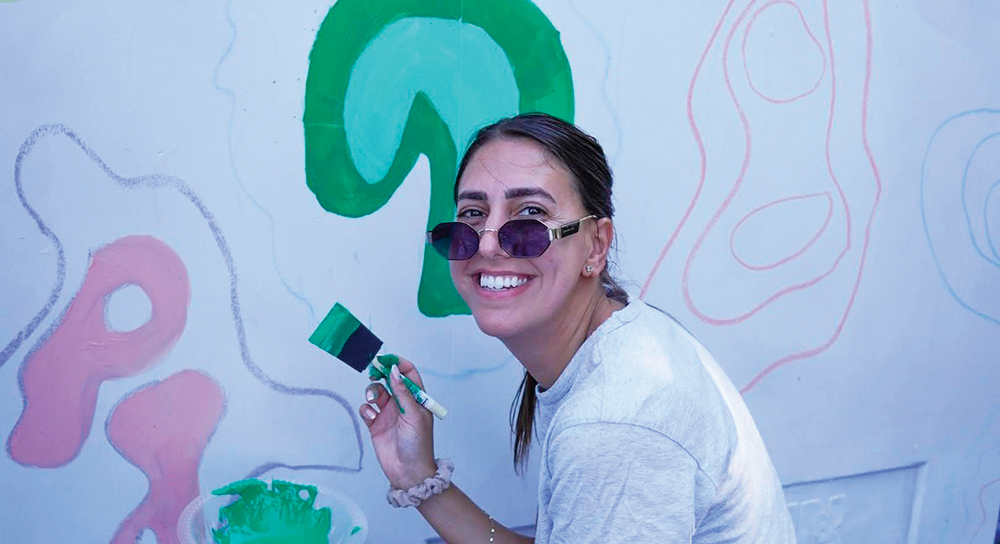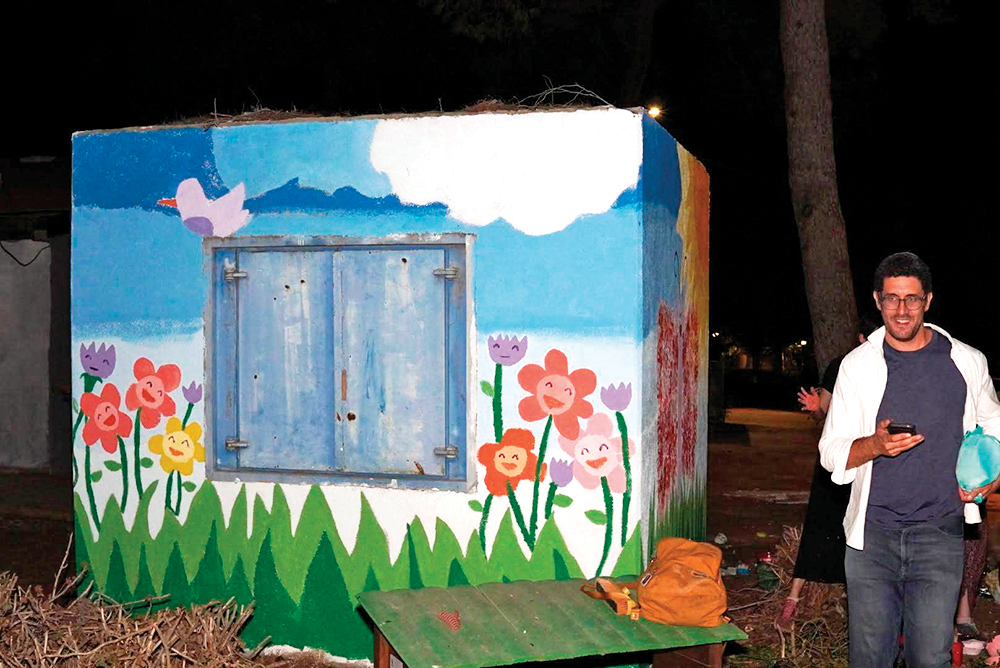While displaced for 10 months in a Tel Aviv hotel, Nir Am evacuees were embraced by the Orthodox Union’s Jewish Learning Initiative on Campus community.

(Courtesy of OU JLIC) When Rabbi Joe Wolfson learned shortly after Oct. 7 that tens of thousands of evacuees from Israel’s southern and northern regions would be relocating to hundreds of hotels in his city of Tel Aviv, he immediately rallied his community to help them.
Wolfson and his wife Corinne run Tel Aviv’s Jewish Learning Initiative on Campus (JLIC TLV), a young professional community near Dizengoff Street composed of singles in their 20s and 30s, and young families. A division of the Orthodox Union, JLIC creates warm communities for North American and Israeli students and young professionals, and offers a religious framework that includes Torah study, halachic and spiritual guidance from a resident rabbinic couple, Shabbat and holiday meals, and regular social events, shiurim, holiday celebrations, and Shabbatons.
“While most other JLICs are affiliated with universities and are largely located on college campuses, JLIC TLV is the first community that has nothing to do with a university,” said Wolfson, who launched the Tel Aviv chapter with Corinne in 2022. “Originally, we had envisioned that this branch would help olim to acclimate, but its focus has broadened tremendously. We have around 450 active members and about 20% of them were born in Israel.”

JLIC TLV’s regular programs include weekly shiurim as well as Shabbat and holiday initiatives like tishes, meal match-ups and get-togethers in the park. Wolfson, who also volunteers as the community’s rabbi at a local shul, says JLIC TLV accords significant value to connecting with and supporting the community at large.
Shortly after evacuees from the south and north arrived in Tel Aviv in October 2023, teams of JLIC TLV members visited various hotels to get a sense of how they might be able to help. For the first six weeks, Wolfson said, the aid was strictly humanitarian and JLIC TLV members cooked over 700 meals for evacuees across five hotels.
After the evacuees’ basic needs were met, JLIC TLV got to work supporting them in other important ways, including creating a work match website for those who had lost their jobs due to relocation, and pairing evacuee families with JLIC TLV members who could befriend them and guide them around the community.
Since Oct. 7, JLIC TLV has run over 150 weekly activities for evacuee children in 24 hotels, including carnivals, theme park outings, bringing ice cream trucks to the hotels, and arts and crafts activities.
Among the hotels where JLIC TLV lent support was Herods, where the residents of Kibbutz Nir Am had temporarily relocated. Situated less than a kilometer from Sderot, Nir Am is the closest kibbutz to Gaza. On Oct. 7, electricity to the kibbutz was knocked out by rockets. Thanks to the quick thinking of security coordinator Inbal Lieberman, who decided not to restore the power, the kibbutz’s security gate remained disabled, preventing terrorists from gaining entry. Lieberman and her 12-member security team heroically fought terrorists for over three hours until Tzahal arrived.
Through regular interactions with the children of Nir Am at Herods, JLIC TLV members began to form relationships with the families.

“When our relationship began a year ago, it was right around Parshat Lech Lecha, where Avraham and Sarah are the embodiment of hachnasat orchim,” reflected Wolfson. “It was very powerful that this coincided with when we began to form connections with the evacuee families.”
He added, “We always started all of our programming with the evacuated communities by saying, ‘We don’t consider this chesed or tzedaka. This is hachnasat orchim. You are guests in our city, and we’d love to host you like anyone else. The only thing that we ask from you is that when it’s good for you, you invite us back to your community.’”
In mid-August, Nir Am members were told they would be returning to the kibbutz in about 10 days’ time. In preparation, JLIC TLV sourced 300 roses for Nir Am’s children to give as thanks to each hotel staff member, and then hosted a beautiful farewell party attended by 250 kibbutz members. Wolfson raised funds for the event and JLIC TLV members used their skills to run what he called “an incredible final send-off” at the hotel shortly before their departure.
Eyal Massad, his wife Efrat, and their young daughters Ofir and Adva were among the Nir Am members who attended the goodbye party. Massad said it was on a scale beyond what anyone could have imagined.
“We thought it was going to be a very small party, but JLIC TLV elevated it to something very special,” he said. “There really aren’t words to describe what they did for this event. People were so surprised and it was exciting to see the connections that were forged at the party. It was very meaningful.”

Wolfson said that both communities were eager to continue their relationship even once the evacuees returned home. “We realized we shouldn’t be thinking about this as a one-off, but rather as an ongoing friendship in which each community is able to give something to the other, so that something good comes out of this horrible period.”
At the end of August, Nir Am members moved back to their kibbutz. After a period of settling in, the kibbutz invited JLIC TLV to a party celebrating their relationship on Chol Hamoed Sukkot. About 400 people from both communities enjoyed a full day of activities that included carnival games, prizes, inflatables, music, a barbecue and a bonfire.
“Nir Am hosted us in the most gracious, warm way imaginable,” said Shira Greenspan, an award-winning educator, author and artist from Modi’in. “The day was just beautiful and so uplifting. The celebration enabled the Nir Am community, especially the kids, to build new memories and positive associations of being together and welcoming people to their kibbutz.”
One of the projects that the communities launched that day was mural painting on the kibbutz’s many megunioyot (concrete shelters.) Greenspan was part of a team of three talented artists enlisted by JLIC TLV to create the mural designs and oversee the project. She said she became involved out of her desire to help others and also to put a positive spin on the shelters, which connote danger and negative associations for many children.
The mural she designed is on a megunit where the kibbutz children meet daily to board buses to school. In addition to creating the vision—each wall features an element of the kibbutz along with a “portal” overlooking another part of Israel—Greenspan also guided the volunteers who participated in the activity.
“Each mural is beautiful and reflects the painters’ styles,” she said. “Over 100 people were involved in this initiative and each volunteer came with such enthusiasm. While we were painting, there was a siren. In the midst of painting these meguniyot as a celebration of healing, it was a rude reminder that this war is not over. The people of Nir Am are still facing so much, which makes any opportunity that we can help that much more meaningful.”
Massad, who was one of the day’s organizers, said the day will long be remembered as one that raised everyone’s spirits.
“To have the meguniyot painted with colorful designs really brought light to the kibbutz,” he noted. “Weeks later, people still stop me around the kibbutz to tell me how amazing that day was on Chol Hamoed Sukkot. And it’s just the beginning. We really want to further develop this relationship between our communities. My vision is that families will host the JLIC TLV community to stay over and that we will be close for many years to come. It has really been a privilege to get to know the JLIC TLV community.”
Wolfson said that JLIC TLV and Nir Am are currently discussing future plans, including Chanukah parties, English lessons for Nir Am children taught by JLIC TLV members, meeting up for pizza in Ashkelon, and Nir Am families adopting lone soldiers from the JLIC TLV community.
JLIC Executive Director Rabbi Josh Ross is proud of the communities’ growing bond. “In the aftermath of unimaginable tragedy, JLIC TLV and Kibbutz Nir Am have discovered something profound: true healing happens through connection. Our partnership isn’t just about rebuilding communities but about rebuilding hope, one friendship at a time.”









